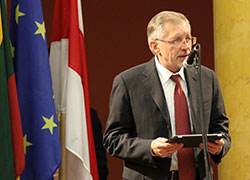Gediminas Kirkilas: Belarusians and Lithuanians have always struggled for freedom together
- 27.03.2013, 11:07

A deputy speaker of the Lithuanian Seimas congratulated the Belarusians on Freedom Day.
He made a speech at a festive reception in Vilnius Town Hall on occasion of the 95th anniversary of proclamation of the Belarusian People's Republic.
The politician drew parallels between the history of the two countries.
“Independence of the Belarusian People’s Republic was declared on March 25th, 1918, by Rada, the Council of the Belarusian People’s Republic. The declaration was an important document, outlining long-lasting hopes and main political aspirations of the Belarusian people – to have an independent country.
A bit more than a month ago, on February 16th, we also had such anniversary. Taryba, the Council of Lithuania, a month earlier, in February, signed the Independence Act on February 16th. That is why we, Lithuanians, understand well the historical, political and emotional importance of this date for Belarusian people. It is very symbolic and important for us today to be together.
Neither of the documents (the one signed by Rada, and the one by Taryba) did achieve independence. Difficult struggles began to implement the values declared in those documents, threatened by complicated internal conditions and foreign aggression. Even though Lithuania was the first to recognize the independence of the Belarusian People’s Republic, later Latvia and Ukraine, in October the same year the Red Army of the Soviet Russia occupied Belarus forcing the Council to seek exile. They found their exile in Vilnius. Six Rada members worked in the Council of the Lithuanian state, and the head of the Government Jazep Varonka was the Minister of Belarusian Affairs in three Lithuanian governments. In 1920 Kaunas became a temporary Lithuanian capital. Rada worked from there, as well,” Gediminas Kirkilas said.
The politician reminded that the governments of Belarus and Lithuania closely cooperated both morally and ideally supporting each other and intellectuals of the countries were united by common ideas of liberation, national statehood and modern future. Majority of arts, culture, national renaissance and political figures who cherished the values of the Belarusian people and fostered Belarusian national identity, acted in Vilnius, which became their cultural centre.
“Alas, now we cannot rejoice in the same way, since “the distance” between us, the closest neighbours, often seems to be very large not because of the choice of the Belarusian people, but due to the values of the existing Belarusian authorities. This shouldn’t have happened, we live on the same land of old Europe. The Grand Duchy of Lithuania was a large country of our forefathers: Belarusians, Lithuanians, Poles, Russians, Ukrainians gave Europe a unique historical source, a treasure of language and culture – Lithuanian Statute, written in the old Belarusian language. Our people’s heroic Grunwald victory changed the power balance in Europe and started its new era. This year Lithuania celebrates the 150th anniversary of our nation’s national and social uprising, which started in 1863 by Kastus Kalinouski, Zygmunt Sierakouski and Antanas Mackevičius, whose struggle is an important example of our common history, which obliges us today to strive as hard as we can so that Belarus, as Lithuania six years ago, would become a full-fledged EU Member. EU Member States, on the top level, initiated the European Neighborhood Policy, so that it wouldn’t be necessary to wait decades until Belarus becomes an EU and NATO member,” the politician said.
Gediminas Kirkilas noted the 21st century brings new conditions and challenges, which can be resolved not by separate states but by regions. With expanding EU borders, there is a necessity to assess relations with the neighbours, to improve cooperation, foster stability and security beyond the EU borders.
“The EU initiated Eastern Partnership plan to develop EU’s relations with Armenia, Azerbaijan, Belarus, Georgia, Moldova and Ukraine, aiming to develop economical integration, stimulating trade, and having perspectives of no visa travel. Lithuania hopes that EU Eastern Partnership will become an effective instrument allowing Belarus to move towards European values,” he noted.
Gediminas Kirkilas congratulated all guests on the holiday and expressed a hope for a European future of Belarus.
“Despite our countries’ roads have parted, by joint efforts, we will achieve that in the future we will be connected by common goals and priorities: freedom, human rights, democracy and people’s wellbeing,” he said.









